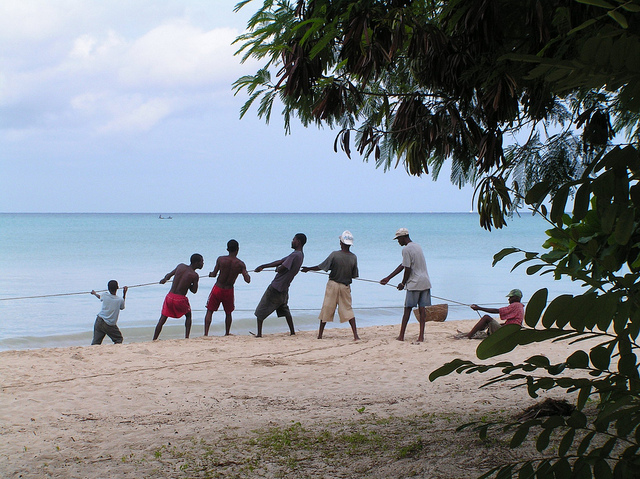On Saturday my EarthSpark colleague, Allison, and I took a break from work to bike deep into the countryside. The ride along the Caribbean coast on a dirt road in southwestern Haiti at the tip of the backwards C was absolutely beautiful. We passed small one and two room homes, thatched roofs, whitewashed walls, that held families of 4 – 10 people (lots of kids here.) We stopped to cool off in the Caribbean twice and also paused in the shade to purchase a very juicy and refreshing watermelon and to quench our thirst with coconut water from a freshly opened coconut.
We biked westward for 2.5 hours until my left pedal fell off and my rear tire went flat. Separately, I plan to write a book about the perils of 3rd world bike rentals. Keep your eye on Amazon books.
Haiti is a mountainous country and the green hills are covered in fast growing grass…but are mostly devoid of trees. No real stands of trees along our entire 2.5 hour ride. This is a result of unlimited cutting to produce charcoal and very limited replanting to replace the stripped trees. We passed eight charcoal manufacturers: Mounds of dirt covering tee-pee shaped wood piles. The wood had been lit, then before fully burning, covered with dirt so that the wood would continue to burn in the absence of oxygen, thereby converting the unburned wood to charcoal. Which brings me to the reason I am in rural Haiti.
I am assisting in the launch of a clean energy store. Beginning July 7, the residents of Les Anglais and the surrounding countryside will be able to purchase home solar lighting and various cook stoves that are more efficient than traditional stoves. Stoves currently in use are basically free standing metal grates that hold charcoal with a cooking pot set directly on the charcoal. I suspect that a 50 year old Weber grill is substantially more efficient. One of our products is called, in Creole, Recho Mirak, or the Miracle Stove. This stove, if not quite a miracle, is nevertheless a great benefit. It uses 25% less charcoal than traditional stoves. In a very poor country, reducing charcoal expenditure by 25% is a big deal. And slowing deforestation by 25% is a big deal, too. We even have the Eco Stove which uses 50% less charcoal…but costs substantially more than traditional charcoal stoves.
So, 2.5 hours out of town with a dysfunctional bicycle required us to flag down a passing tap tap: the ubiquitous rural Haitian bus. Our tap tap was a pick up truck with two parallel wooden benches running along the sides of the pick up bed. There was room for 8 seated passengers, but with the inclusion of our bikes and a very large bag of charcoal and another of coconuts headed to market, three of the passengers had to ride on the top of the cab.
We ultimately made it back to town to continue preparation for our July 7 store launch. Stay tuned.

